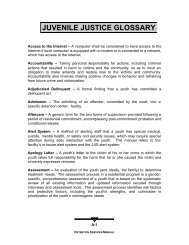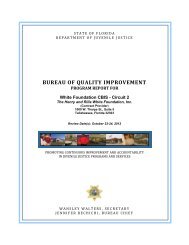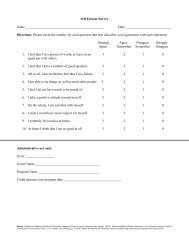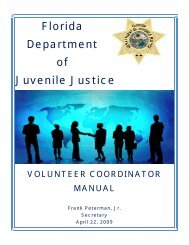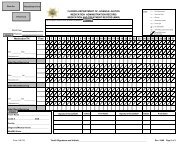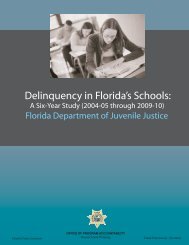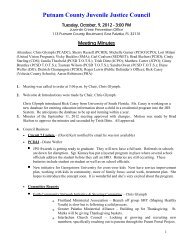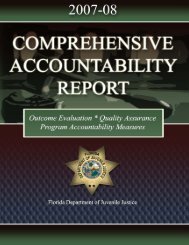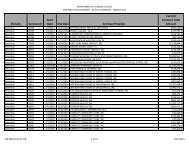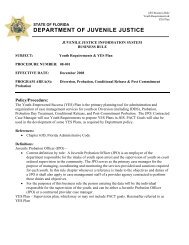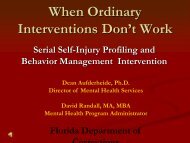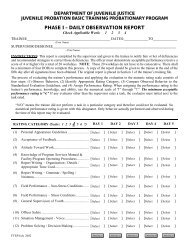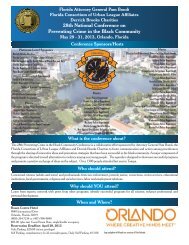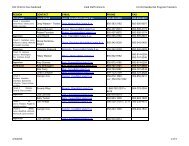Infant Mental Health: Principles and Practices
Infant Mental Health: Principles and Practices
Infant Mental Health: Principles and Practices
You also want an ePaper? Increase the reach of your titles
YUMPU automatically turns print PDFs into web optimized ePapers that Google loves.
<strong>Infant</strong> <strong>Mental</strong> <strong>Health</strong>:<br />
<strong>Principles</strong> <strong>and</strong> <strong>Practices</strong><br />
Anne E. Hogan, PhD, FSU CPEIP<br />
for Florida’s Statewide Workgroup on<br />
Trauma Informed Care<br />
March 16, 2011
Evolution of Best Practice<br />
Child-Focused<br />
Family-Centered<br />
Relationship-Based
What is <strong>Infant</strong> <strong>Mental</strong> <strong>Health</strong>
<strong>Infant</strong> <strong>Mental</strong> <strong>Health</strong> is:<br />
The developing capacity from birth to 3 to:<br />
Experience, regulate, <strong>and</strong> express emotions<br />
Form close relationships<br />
Explore the environment <strong>and</strong> learn<br />
…all in the context of family, community, <strong>and</strong> cultural<br />
expectations for young children.<br />
(Zero To Three <strong>Infant</strong> <strong>Mental</strong> <strong>Health</strong> Task Force, 2001)
Basic Characteristics of<br />
<strong>Infant</strong> <strong>Mental</strong> <strong>Health</strong> Approach<br />
Relationship-Based Framework<br />
Multigenerational Perspective<br />
Developmental Orientation<br />
Multidisciplinary Approach<br />
Prevention Emphasis
LEVEL 1<br />
Strengthening the<br />
Caregiver/Child Relationship<br />
LEVEL 2<br />
Developmental,<br />
Relationship-Focused<br />
Early Intervention<br />
LEVEL 3<br />
<strong>Infant</strong> <strong>Mental</strong> <strong>Health</strong> Treatment
CSEFEL Pyramid Model<br />
CSEFEL. (2008). The pyramid model.<br />
Retrieved 5/21/09 from<br />
http://www.v<strong>and</strong>erbilt.edu/csefel/
LEVEL 1<br />
Strengthening the Caregiver/Child Relationship
Responsive caregiving<br />
•Underst<strong>and</strong> child’s cues<br />
•Promote continuity of care<br />
•Knowledge of developmental stages<br />
Environments that support exploration,<br />
practice <strong>and</strong> mastery<br />
•Support development within the family<br />
•Provide family support & education<br />
•Refer for further screening/assessment
Who provides Level 1 <strong>Infant</strong><br />
<strong>Mental</strong> <strong>Health</strong> services<br />
Front-line caregivers including:<br />
Parents<br />
Childcare Providers<br />
<strong>Health</strong> Care Providers<br />
Home Visitors<br />
Parent Educators<br />
Social Workers<br />
Child Protection Case<br />
Workers<br />
Police Officers, Judges,<br />
Lawyers
LEVEL 2<br />
Developmental, Relationship-Focused Early Intervention
Identify emotional or attachment concerns<br />
in children or parent-child relationships<br />
Integrate relationship-based practices<br />
into<br />
child’s therapies, medical treatment,<br />
foster care<br />
Consultation to enhance relationships
Maltreated Children Have More<br />
Delays in Development<br />
38-65%+ of maltreated<br />
children have delays<br />
compared with 10-12% in<br />
the general population.<br />
Barth, R., Scarborough, A., Lloyd, C., Losby, J., Casanueva, C., & Mann, T. (April<br />
2008). Developmental status <strong>and</strong> early intervention service needs of maltreated<br />
children: Final report
Maltreatment at early age<br />
is related to poor<br />
developmental outcomes:<br />
cognitive problems (23-65%)<br />
speech delays (14-64%)<br />
health problems (22-80%)<br />
motor delays ( 4-47%)<br />
mental problems (10-61%)
CAPTA: 108-36<br />
(Child Abuse Prevention & Treatment &<br />
Adoption Reform) 2003<br />
Requires states to<br />
have procedures for<br />
referral to Part C for<br />
screening for children<br />
under 3 involved in<br />
substantiated case of<br />
child abuse or neglect
Who provides Level 2 <strong>Infant</strong><br />
<strong>Mental</strong> <strong>Health</strong> Services<br />
Social Workers (MSW), Psychologists, <strong>Mental</strong><br />
<strong>Health</strong> Therapists<br />
Child Development Specialists<br />
Early Interventionists<br />
Therapists (Occupational, Physical <strong>and</strong><br />
Speech)<br />
Public <strong>Health</strong> Nurses<br />
Developmental Pediatricians
LEVEL 3<br />
IMH Assessment & Treatment
IMH Specialists with clinical competencies &<br />
expertise in young children
Comprehensive Assessments<br />
For children under 6,<br />
must include assessment<br />
of baby, baby’s<br />
interactions, <strong>and</strong> baby’s<br />
relationships<br />
Serves as guide for<br />
placement, need for<br />
further services, <strong>and</strong><br />
permanency planning
Treatment
Sample Intervention/<br />
Treatment Models<br />
<strong>Infant</strong>/Toddler/Child – Parent Psychotherapy<br />
Watch, Wait <strong>and</strong> Wonder<br />
Interaction Guidance<br />
Circle of Security<br />
ABC/ Attachment <strong>and</strong> Biobehavioral Catch-up<br />
PCIT/ Parent-Child Interaction Therapy<br />
Triple P/ Positive Parenting Program<br />
NFP/ Nurse-Family Partnership
Who provides Level 3 <strong>Infant</strong><br />
<strong>Mental</strong> <strong>Health</strong> Services<br />
Licensed mental health professionals with<br />
advanced training, including:<br />
• Child, Adolescent, & Adult psychopathology<br />
• Development in infants/toddlers, <strong>and</strong> early<br />
parent-child interactions & relationships<br />
• Assessment & Treatment within parent-child<br />
relationship, including dyadic psychotherapy
The Intervention Relationship<br />
Development Depends on Relationships<br />
Security & Acceptance Support Development<br />
Mutuality & Dialogue support Development<br />
Too much Anxiety Impedes Development
The Intervention Relationship<br />
Regardless of the interventionist’s discipline,<br />
the Working Alliance matters<br />
Keys to Working Alliance<br />
• Communication<br />
• Tolerance<br />
• Attention<br />
• Mutual Influence<br />
• Empathy
Resources for EBPs<br />
California Evidence Based Clearinghouse<br />
• http:www.cachildwelfareclearinghouse.org/<br />
National Registry of Evidence-based<br />
Programs <strong>and</strong> <strong>Practices</strong><br />
• www.nrepp.samhsa.gov/
Relevant DCF – Sponsored<br />
Training<br />
Trauma, Attachment <strong>and</strong> Reactive<br />
Attachment Disorder<br />
Duke’s Center for Child <strong>and</strong> Family<br />
<strong>Health</strong> faculty<br />
Upcoming dates<br />
• Orl<strong>and</strong>o – 3/16-17<br />
• Ft. Myers - 9/13-14<br />
• Gainesville - 11/16-17 AND MORE in<br />
2012!



